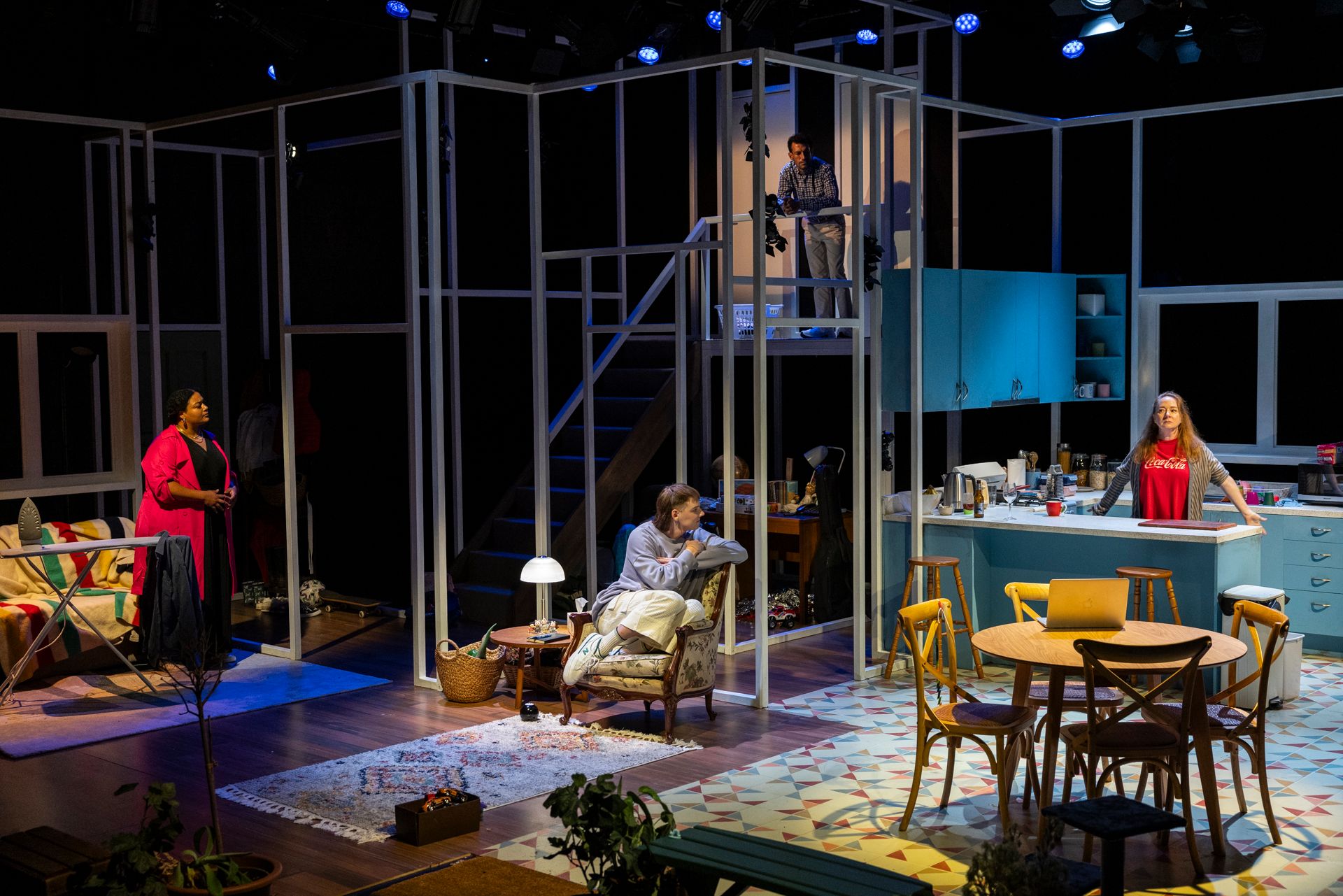Commenting on the play, director Lee Lewis said, “Tiny Beautiful Things is about every person on the planet and every problem you could possibly have.” Based on the 2012 book of the same name by American author Cheryl Strayed and adapted by Nia Vardalos (My Big Fat Greek Wedding), Tiny Beautiful Things shines a spotlight on darkness, fear and shame, and turns it into something beautiful. The story, staged at the Belvoir St Theatre, focuses on the character Cheryl Strayed, A.K.A. Sugar (Mandy McElhinney), who volunteers to become an online advice columnist and must respond to the strangest, saddest and most heartfelt questions from people of all stripes.
The play had only four actors, three of whom were posing the questions to Sugar. These characters were named only by the words they signed off as, like “Confused,” “Thief,” and “WTF.” Despite only being able to spend a short time listening to their woes, it was easy and seamless to gauge what they cared about. The anonymity of an online column developed a satisfying intimacy that allowed the questioners to bare the most earnest parts of themselves, expressing their troubles and fears in a way that would be impossible in person.
Sugar is by nature a very compassionate person, who uses her past trauma like the death of her mother, her estrangement with her father, her struggle with heroin and a history of sexual abuse with her grandfather as ways to empower others by giving them honest advice and freeing these vulnerable people from their shame and self-loathing.
The set,designed by Simone Romaniuk, was constructed as an open-plan house, which grounded the play in the domestic life of Sugar and made it easy to feel comfortable and familiar with her. Wooden frames were used to represent doors and made rooms easier to see. The house appeared very dishevelled at the beginning, with clothes strewn over the floor, childrens’ toys lying around, and many things left dirty or untidy. Sugar moved gradually around the house throughout the play, cleaning things up, doing the washing, putting the kettle on, and going through a series of mundane household tasks that felt quite beautiful in their simplicity; much like the message of the play, which guided the audience to appreciate the small and mundane things in their ordinary resplendence.
Following the set design, the lighting (Bernie Tan-Hayes) was partly composed of house lights, and partly of lamplights scattered around the set. The soft yellows of the dimmed lamps made the environment feel very cosy, and metaphorically suggested how the forum and online environment that Sugar created was equally a comfortable space for its users to be themselves. Brady Watkins worked on sound design, using quiet, natural soundtracks and meditative music that allowed the audience to reflect on the words of the characters and to emphasise certain moments, although sometimes the meditative effect felt a little excessive, like when one character was talking about the death of his son through a list rather than a letter, and on each of the 23 points he made, a note played — and again when Sugar responded to him with a 24-point list. This detracted from the quality of the moment and could have been given more silence in which audiences could reflect.
The play’s costume design was simple yet effective. Each character wore ‘everyday’ clothes, enhancing the overall authenticity of Tiny Little Things. McElinney’s Cheryl Strayed, for example, wore an oversized Coca Cola pyjama shirt for the entire production, mirroring the character’s late-night writing habits.
Perhaps the play’s most overarching success was its ability to capture the multiple complexities of being human; mirroring the play’s epistolary structure. The play’s dialogue was structured around snippets of Sugar’s life advice column. Whether this be the complexities of love and relationships, the turbulence of human emotions, or the harsh realities of grief and loss of a loved one, the play effortlessly emulated the nuances of life itself. One character explained how she was no longer in love with her husband and she felt obliged to stay with him, but she didn’t know whether leaving to pursue her own goals was more worthwhile than staying with her stable family and sacrificing her desires. Another character recounted how when she came out as trans she broke ties with her family because of how badly they reacted. These stories were enhanced by the heartfelt acting of the cast members – especially McElinney – who delivered this ‘advice’ with passion, sincerity, and, at times, incredible wit.
Ultimately, at the heart of Tiny Beautiful Things is the power of human connection. The play shines a spotlight on how writing and sharing our deepest fears, dreaded secrets, and even our “WTF” concerns can allow us to heal emotionally and grow as individuals. In offering something for every audience member to relate to their own experience, the play itself generates a sense of connection amongst us gathered in the theatre, inspiring us to seek the things that make our lives beautifully rich, no matter how tiny they may be.
Tiny Beautiful Things is playing at The Belvoir St Theatre from Thursday 1st February until Saturday 2nd March, 2024.





